10 Best VoIP Phones For Your Business : Full Review (2025)
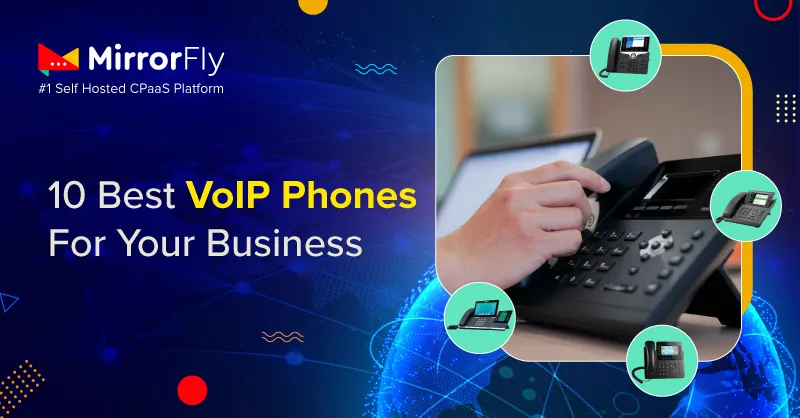
Comparison of the most popular VoIP phones for small to enterprise businesses.
Post pandemic, VoIP (Voice over Internet Protocol) is becoming a popular form of communication. VoIP phones use the internet to transmit calls digitally, replacing traditional phone lines. They offer connectivity, mobility, and agility, essential for modern teams.
You have two main options: softphones, which are software-based and run on devices like laptops and mobiles, and dedicated hardware phones.
Investing in dedicated hardware phones can be beneficial, given the wide variety available. To help you choose, here are our top VoIP phone picks for 2025.
Table of Contents
What Is A VoIP Phone?
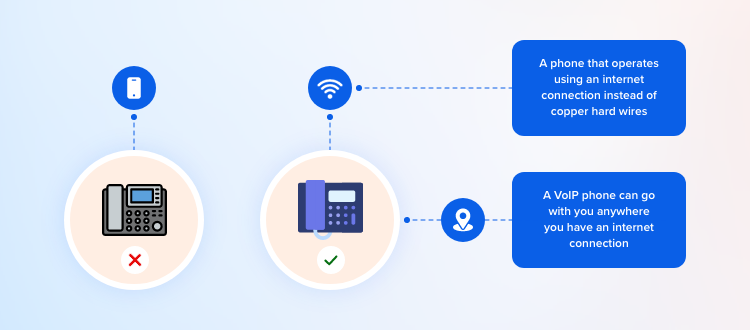
VoIP phones use VoIP technology to transmit voice calls and messages over an IP network. Whether hardware or software-based (softphones on laptops/desktops), they enable connections similar to WhatsApp or Skype calls.
Now, let us look at the differences between a Voice Over IP, Traditional and an IP telephony.
What are the types of VoIP phones?
There are two main types of VoIP phones:
1. Hard Phones:
These are physical telephones that transmit voice signals through your internet connection. They plug directly into your business network for operation.
Pros of Hard Phones:
- Familiarity: They resemble traditional phones, making them easy to use for employees familiar with landline phones.
- Durability: They are typically built with sturdy materials, making them more durable than software-based alternatives.
- Advanced Functionality: Often equipped with advanced features tailored for VoIP technology, it enhances communication capabilities.
2. Softphones:
Softphones are software-based versions of telephones that can be installed on various devices with an internet connection. They provide mobility for users to make and receive calls from anywhere and are ideal for remote workers or those frequently on the move.
Pros of Softphones:
- Mobility: Softphones can be installed on various devices, enabling users to make and receive calls from anywhere with an internet connection.
- Flexibility: Softphones are ideal for remote workers or employees frequently on the move, offering flexibility in communication methods.
- Cost-Effectiveness: Generally cheaper to implement and maintain than hard phones, as they utilize existing hardware and require less physical infrastructure.
VoIP vs Traditional Phone Systems vs IP Telephony
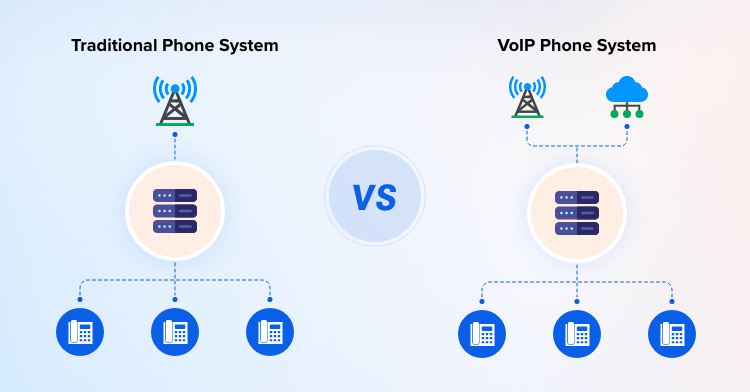
VoIP and IP telephony are often used interchangeably. IP telephony refers to digital phone systems using the internet, unlike traditional analog systems. Whereas, VoIP is a type of IP telephony that prioritizes and transmits voice traffic over the network. Essentially, they mean the same thing.
On the other hand, Traditional phone systems transmit calls through landlines, limiting users to their desks without internet access. This lack of flexibility has led to the decline of landlines in homes and businesses. And it is important to consider that organizations these days seek more agile systems to support growth.
The table below provides a concise overview of the main differences between VoIP Phone, Traditional Phone, and IP Telephony systems.
| Characteristics | VoIP Phone | Traditional Phone | IP Telephony |
|---|---|---|---|
| Communication | Voice over Internet Protocol (VoIP) | Analog transmission over landlines | Digital transmission over the internet |
| Network | Utilizes internet connection | Relies on landline infrastructure | Utilizes internet connection |
| Flexibility | Allows mobility and remote access | Limited to physical location | Allows mobility and remote access |
| Features | Offers advanced features like call forwarding, voicemail to email, etc. | Basic call functions | Offers advanced features similar to VoIP Phone |
| Cost | Generally cost-effective, especially for long-distance and international calls | Cost varies based on provider and usage | Generally cost-effective, similar to VoIP Phone |
| Installation | Requires internet connection and VoIP service setup | Plug into existing landline infrastructure | Requires internet connection and setup of IP telephony system |
The Top VoIP And IP Phones
Here are the 10 best VoIP phones: 1. Cisco SPA 303, 2. Cisco 8861, 3. Grandstream GXP 2170, 4. Grandstream GXV3370, 5. Polycom VVX 301,6. Yealink T57W, 7. Yealink T57W, 8. Yealink SIP-T21P E2, 9. Yealink SIP-T19P E2, 10. Unify CP700. These you may find useful for using for your business communications. The list is in no particular order.
1. Cisco SPA 303
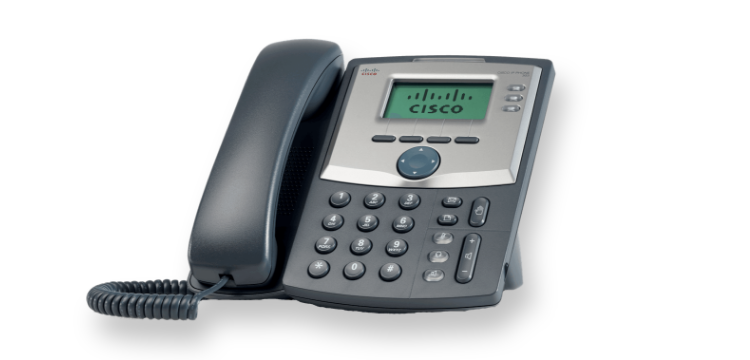
Best For: Small to medium-sized businesses, home offices, and remote workers.
The Cisco SPA 303 is a budget-friendly VoIP phone ideal for small businesses. Despite its low cost, it supports three phone lines and essential call handling features such as caller ID, hold, and conferencing.
While it may lack advanced features, it’s a practical choice for businesses that prioritize cost-effectiveness and basic functionality in their VoIP service and hardware.
Key Features:
- Encrypted communications.
- Fully programmable line keys.
- Unified communication features.
- Integrated gigabit Ethernet switch.
- Low power consumption.
Compatibility: Works well with Cisco Unified Communications Manager (CUCM) and other SIP-based VoIP systems.
Hardware: The Cisco SPA 303 has an LCD display and offers excellent voice quality.
Audio Quality: Crystal-clear voice quality and reliable connections.
2. Cisco 8861
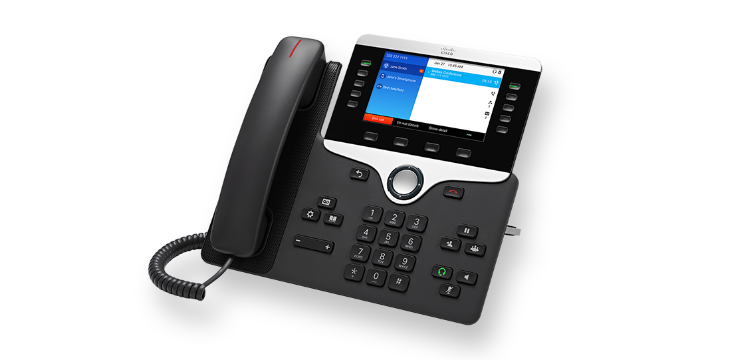
Best For: Enterprise-level businesses, corporate offices, and call centers.
The Cisco 8861, designed for contact centers, corporate offices, and enterprise-level enterprises, is a VoIP phone that shines because of its superior security features and video capabilities, with other SIP-based systems like Cisco Unified Communications Manager (CUCM).
With its elegant appearance, the Cisco 8861 is a powerful and multifunctional communication tool that guarantees excellent quality than other VoIP phones.
Key Features:
- High-resolution color display.
- Bluetooth compatibility.
- Gigabit Ethernet ports.
- Video support.
- Enhanced security features.
Compatibility: Compatible with Cisco Unified Communications Manager (CUCM) and other SIP-based systems.
Hardware: Sleek design with a large color screen.
Audio Quality: Excellent voice clarity and noise reduction.
3. Grandstream GXP 2170
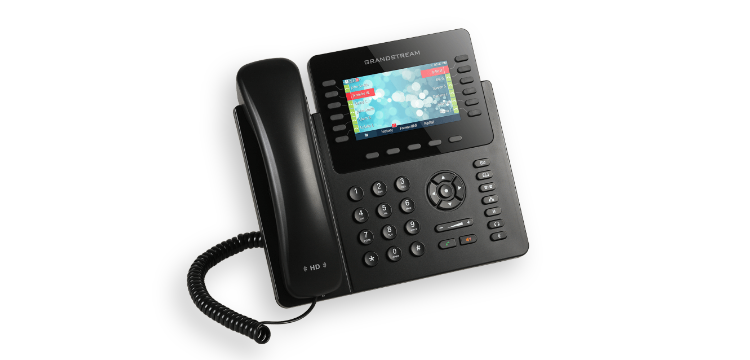
Best For: Small businesses, home offices, and remote workers.
The robust IP phone GXP 2170 from Grandstream is perfect for small businesses. It’s ideal for companies, personal offices, and remote workers because it has two gigabit Ethernet ports.
It guarantees dependable and effective communication and is easy to use and compatible with the majority of SIP-based VoIP systems.
Key Features:
- 12 lines and 6 SIP accounts.
- Dual Gigabit Ethernet ports.
- Built-in Bluetooth.
- HD audio.
- Integrated PoE.
Compatibility: Works with most SIP-based VoIP systems.
Hardware: Large color display and programmable keys.
Audio Quality: High-definition audio for clear conversations.
4. Grandstream GXV3370

Best For: Executive offices, conference rooms, and video conferencing.
The GXP 2170 from Grandstream is a particularly strong IP phone designed for small organizations. With 12 lines of support, Bluetooth connectivity, and HD audio quality provide smooth conversation.
With its 44 customizable keys, 4.3″ color LCD, and affordable price, this device is ideal for home offices, remote work, and companies. Effective communication is ensured by the phone’s user-friendly design, which integrates effortlessly with the majority of SIP-based VoIP systems.
Key Features:
- Android-based operating system.
- 7-inch touchscreen display.
- Video calling and conferencing.
- Built-in Wi-Fi and Bluetooth.
- HDMI output for external displays.
Compatibility: Compatible with most SIP-based VoIP platforms.
Hardware: Touchscreen interface and sleek design.
Audio Quality: Excellent audio for both voice and video calls.
5. Polycom VVX 301
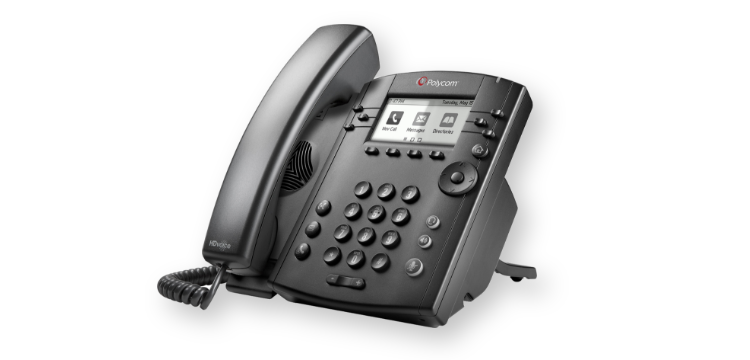
Best For: Small businesses and call centers.
For small enterprises and contact centers, the Polycom VVX 301 is a cheap VoIP phone with HD voice, and basic call capabilities.
It provides noise cancellation and crystal-clear audio quality and is compatible with a wide range of SIP-based systems. Though it lacks Bluetooth and video calling, it’s still a solid entry-level device.
Key Features:
- 6-line display.
- HD voice.
- PoE support.
- Easy setup and management.
- Backlit LCD screen.
Compatibility: Works with various SIP-based systems.
Hardware: Compact design with an intuitive interface.
Audio Quality: Clear voice quality and noise cancellation.
6. Poly VVX 450
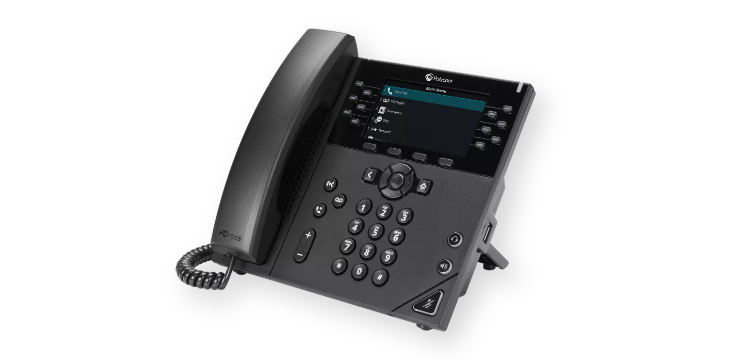
Best For: Corporate offices, knowledge workers, and executives.
A premium VoIP phone for executives and business offices is the Poly VVX 450. It is compatible with Polycom VVX systems and SIP-based platforms and has a 4.3-inch color display, advanced call management with 12-line appearances.
It also comes with gigabit Ethernet connections for quick network connectivity. The phone is a powerful communication tool since it guarantees clear audio for both voice and video calls.
Key Features:
- 12-line display
- Color touchscreen
- Gigabit Ethernet ports
- Video support
- Advanced call handling features
Compatibility: Compatible with Polycom VVX systems and other SIP-based platforms.
Hardware: Sleek design with a large color touchscreen.
Audio Quality: High-definition voice call and excellent audio performance.
7. Yealink T57W
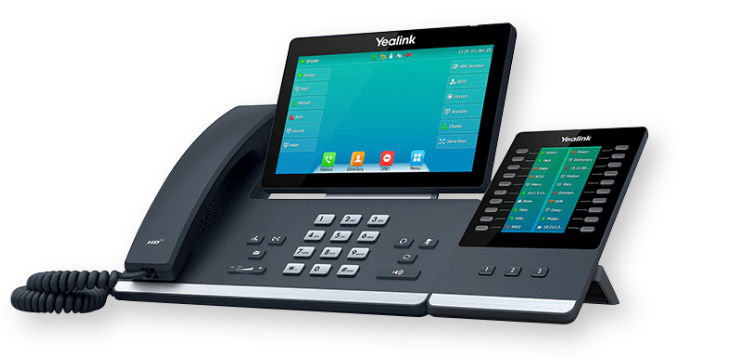
Best For: Mid-sized businesses, reception areas, and administrative offices.
Key Features:
- 16 SIP accounts.
- 7-inch color touchscreen.
- Built-in Wi-Fi and Bluetooth.
- HD audio.
- USB port for call recording.
Compatibility: Works with most SIP-based VoIP systems.
Hardware Details: User-friendly interface and programmable keys.
Audio Quality: Crystal-clear voice and noise reduction.
8. Yealink SIP-T21P E2
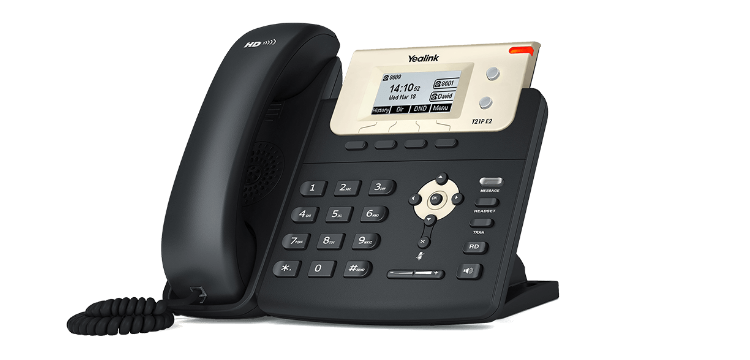
Best For: Small offices, home-based businesses, and startups.
Compared to the T21P, the Yealink SIP-T21P E2, which is considered as an entry-level VoIP phone, offers a more robust IP solution. It is suitable for compact workspaces, remote companies, and new ventures.
It boasts a 5-line display, high-definition audio, a wall-mountable stand, support for two VoIP accounts, and power-saving PoE technology.
Key Features:
- 2-line display.
- PoE support.
- Easy installation.
- Basic call features.
- Affordable pricing.
Compatibility: Compatible with various SIP-based systems.
Hardware Details: Simple design with essential features.
Audio Quality: Good voice clarity for everyday use.
9. Yealink SIP-T19P E2
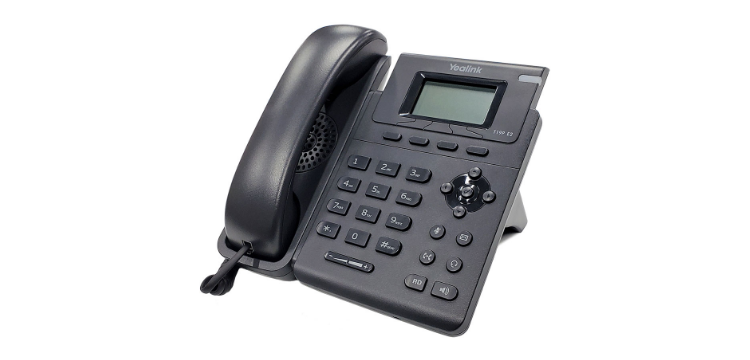
Best For: Budget-conscious businesses, small retail stores, and home offices.
For a wide range of consumers, the Yealink SIP-T21P E2 and SIP-T19P E2 are very affordable VoIP phone solutions. The SIP-T21P E2 has a wall mount option, a 5-line display, supports two VoIP accounts, and makes use of PoE technology.
In the meantime, the SIP-T19P E2, an entry-level IP phone with a single line, has a graphical LCD display along with standard call functionality. It puts an emphasis on secure communication and supports QoS, VLAN, SRTP/HTTPS/TLS, and IPv6.
Key Features:
- Single-line display.
- Basic call features.
- Energy-efficient design.
- Easy setup.
- Cost-effective.
Compatibility: Works with most SIP-based VoIP platforms.
Hardware Details: Compact and straightforward.
Audio Quality: Decent voice quality for essential communication.
10. Unify CP700
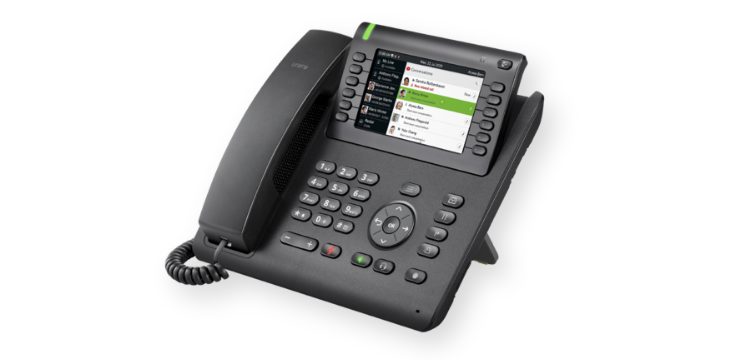
Best For: Mobile workers, freelancers, and travelers.
For companies looking for a feature-rich and reasonably priced desk phone, the Unify CP700 stands out as the best option. Its extra-large display, dual audio stream Bluetooth compatibility, and sophisticated user interface make it suitable for professionals, executives, and call handlers who lead hectic lives.
The phone offers improved call-handling functions in addition to increased interoperability, guaranteeing excellent audio quality for efficient communication.
Key Features
- Portable speakerphone
- Bluetooth and USB connectivity
- HD audio
- Noise cancellation
- Long battery life
Compatibility: Compatible with various VoIP platforms and devices.
Hardware Details: Lightweight and compact design with touch buttons.
Audio Quality: Superb voice quality and background noise reduction.
VoIP Phones: How Does Work?
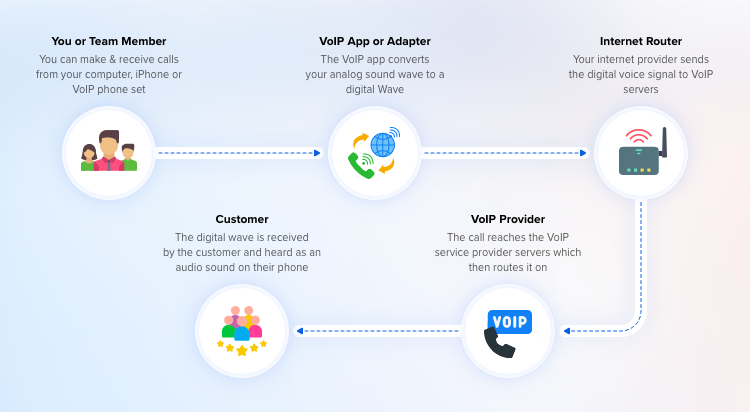
VoIP phones, whether hard phones or softphones, operate similarly by leveraging internet connections to transmit voice signals instead of traditional phone lines. Here’s a simplified explanation of how VoIP phones work:
Let’s walk through a real-life scenario involving a user named John using a VoIP phone with a service provider like MirrorFly:
Stage 1: Preparation
John, a business professional, needs to make an important international call to a client. He picks up his VoIP phone, which is connected to his office network.
Stage 2: Call Initiation
John dials the number using the keypad on his VoIP phone. The phone’s interface displays the number as he enters it. He then presses the call button.
Stage 3: Analog-to-Digital Conversion
As John speaks into the phone’s receiver, the analog sound waves of his voice are converted into digital data by the phone’s built-in analog-to-digital converter (ADC).
Stage 4: Compression and Packetization
The digital voice data is compressed and divided into small packets by the VoIP phone. Each packet contains a portion of the voice data along with routing information.
Stage 5: Transmission
The packets are transmitted over the internet through John’s office network. The VoIP phone is connected to the network either through an Ethernet cable or Wi-Fi.
Stage 6: Routing
The packets travel through various network devices within John’s office network, such as routers and switches, before reaching the MirrorFly servers.
Stage 7: MirrorFly’s Infrastructure
MirrorFly’s servers receive the packets from John’s VoIP phone. They process the packets, handle call setup procedures, and route them towards the recipient’s device.
Stage 8: Interconnection
MirrorFly’s servers may interconnect with other networks or service providers to facilitate communication with the recipient, who may be using a VoIP phone or a traditional phone connected to the PSTN.
💡Do you know?
You can also host your app on your own company servers, while leveraging MirrorFly’s custom solution?
Stage 9: Destination
The packets reach the recipient’s device, whether it’s another VoIP phone, a VoIP application on a smartphone, or a traditional phone connected to the PSTN.
Stage 10: Decompression and Playback
The recipient’s device receives the packets, decompresses the digital voice data, and converts it back into analog audio signals. The recipient hears John’s voice through the device’s speaker or headset.
Stage 11: Conversation
John and the recipient engage in a conversation, discussing business matters and exchanging information.
Stage 12: Call Termination
Once the call is complete, either party can end the call. The VoIP phone terminates the call connection, and any remaining data packets are no longer transmitted.
Throughout this process, John’s VoIP phone, the network infrastructure, and MirrorFly’s services work together seamlessly to enable efficient and reliable communication over the internet.
What advantages do VoIP phones offer?
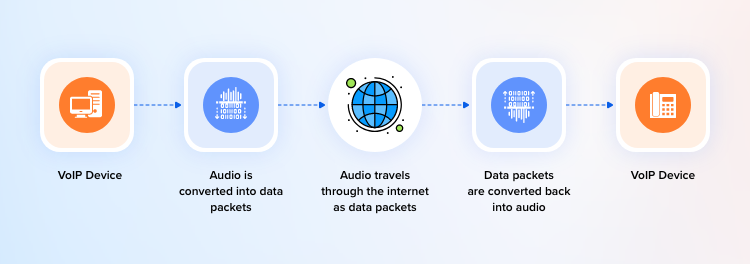
Businesses are increasingly switching to VoIP phone systems due to several advantages:
- Flexibility: VoIP allows for flexibility in call routing and handling, enabling businesses to customize call flows based on their specific needs and workflows.
- Remote Collaboration: VoIP facilitates seamless collaboration among remote teams through features like video conferencing, screen sharing, and instant messaging.
- Global Reach: VoIP enables businesses to establish a global presence by providing local phone numbers in different regions without the need for physical offices or infrastructure.
- Budget-friendly: Compared to traditional phone systems, VoIP offers cost-effective solutions with manageable monthly fees, avoiding large hardware investments.
- Disaster Recovery: VoIP systems offer built-in redundancy and disaster recovery capabilities, ensuring business continuity in the event of network outages or natural disasters.
VoIP Business Phones: How To Pick The Best?
Before checking out the top 10 VoIP phones, it’s important to understand your requirements.
With VoIP systems, you can get functionalities that are not available with traditional landlines. For example, advanced call handling and video conferencing. And if you identify your team’s needs, you can prevent investing in unnecessary features.
Here’s what you need to consider:
- Audio Quality & Reliability: Opt for phones with HD voice quality and reliable service. High-quality calls are essential for modern businesses.
- Security Features: Prioritize VoIP phones with robust security features, such as encryption protocols, secure authentication methods, and firmware updates.
Security measures help protect sensitive business communications and data from potential threats and cyberattacks.
- Cost: Ensure the phone fits your budget while offering necessary functionality. Focus on value rather than just cost to make the right choice.
- Scalability: Choose a VoIP phone system that can scale with your business needs. Ensure the chosen phones and system can accommodate the growth of your organization without significant upgrades or replacements.
- Ease of Use: Select phones with intuitive interfaces and user-friendly features to minimize training time and ensure smooth adoption by employees. User-friendly interfaces can enhance productivity and reduce user errors.
- Vendor Reputation & Support: Research the reputation of VoIP phone manufacturers and service providers. Choose vendors with a track record of reliability, quality products, and excellent customer support to ensure a positive experience and timely assistance when needed.
- Power Source: Consider the power source options for VoIP phones, especially in environments prone to power outages. Some phones offer Power over Ethernet (PoE) capabilities, while others may require separate power adapters or battery backup solutions.
- Connectivity: Choose phones with Wi-Fi and Bluetooth capabilities for enhanced connectivity. Cordless models and hands-free headsets improve flexibility.
- Integration: Consider the ability of VoIP phones to integrate with other business systems and applications, such as CRM software, email clients, and productivity tools. Integration capabilities can streamline workflows and improve overall efficiency.
- Physical Design & Ergonomics: Evaluate the physical design and ergonomics of VoIP phones, considering factors such as handset comfort, adjustable stands, and wall-mounting options.
- Hardware Features & Functionality: Assess core functions and future needs. Look for features like call routing/blocking, conference calling, and video compatibility to support business growth.
- Compatibility: Ensure compatibility with your existing VoIP service provider or the VoIP platform you plan to use. Compatibility issues can lead to functionality limitations or connectivity problems.
By considering these additional factors alongside price, audio quality, reliability, connectivity, and hardware features, you can make informed decisions when selecting VoIP phones that best suit your requirements and objectives.
Now that you know the most popular VoIP phones on the market, the next step is to identify the services that offer the best features, functionalities, and price to set up your business communication. Let’s explore them one by one.
Establishing VoIP Phone Connectivity Through MirrorFly
MirrorFly is a leading in-app communication solution that stands out as a provider of VoIP services for both small and global businesses. It comprises a cloud-based communication system which can help you set up a complete VoIP infrastructure with full freedom to customize the solution as per your business needs.
You can also white-label the set up, and add extra layers of security without any limitations. All you need to do now is, get on a quick call with our experts, discuss your requirements and launch a VoIP communication system within the next few days.
Need more details about MirrorFly? Visit our official website now!
Frequently Asked Questions:
There are several best VoIP providers out there who are known for their reliability, advanced features, and user-friendly interfaces. To name some, Cisco, Poly, and Yealink are all best IP phone manufacturers, ensuring high-quality communication is met for all kinds of businesses.
If it’s for business use, then try using Cisco or Polycom VoIP phones as they offer excellent HD voice and customizable interfaces. However, for home solutions, Yealink and Grandstream come as the best options.
Skype, Zoom, MirrorFly, and Vonage are all popular VoIP service providers, explicitly known for their reliability, ease of use, and extensive feature set.
No, VoIP phones need an internet connection to transmit voice data. Because, without a stable connection, VoIP cannot function.
The cost of a VoIP phone usually varies based on brand, features, and the type of phone used. However, the basic VoIP home phones vary from $50 to $150. And sometimes the VoIP office phones might be as expensive as $300.
The lifespan of VoIP phones are usually high, ranging from five to seven years. And their longevity usually depends on factors like hardware, level of usage, and its maintenance. So, for a longer life span, invest with a reputable manufacturer.
Related Articles:
- What is VoIP Phone? – A Complete Guide in 2025 for Beginners
- What is SIP Calling & How Does It Work?
- List Of SIP Trunk Providers For All Types Of Businesses
- 10 Best SIP Call APIs & SDKs For Enterprise Apps [2025]
- SIP Phones: What They Are & How They Work
Ready To Build Your Own Custom Voice Chat App?
Get our voip phone solution, that can be set up on your company servers.
Request Demo100% customizable
White-label solution
Full source code

Impressive writing style. Your blog is truly engaging and informative. Can I get VoIP for free?
Thank you for your kind words! While some VoIP providers offer free plans with limited features, fully featured VoIP services typically involve some cost. However, you can explore trial periods or introductory offers to experience VoIP functionality at no initial expense.
Thank you Theev for your kind words! While some VoIP providers offer free plans with limited features, fully featured VoIP services typically involve some cost. However, you can explore trial periods or introductory offers to experience VoIP functionality at no initial expense.
After extensive research, we decided to go with Cisco Webex for our business VoIP solution. It offers robust features and integrates seamlessly with our workflow.
Sure Hen, you can go with that.
Sure, you can go with that.
Hi,
This Blog is so informative, keep posting… what about the cost range for VoIP in small business?
The cost range for VoIP in small businesses varies depending on factors such as the provider, features required, and the number of users. Generally, VoIP services for small businesses can range from around $20 to $50 per user per month, with additional fees for extra features or usage.
Hello Guys,
Your blog is a valuable resource. Keep up the great work. Could you explain me that do businesses use VoIP phones? it will help me a lot
Certainly! Businesses use VoIP phones because they offer cost savings, scalability, flexibility in communication, advanced features like call forwarding and voicemail-to-email, and the ability to integrate with other software systems, enhancing productivity and efficiency in their operations.
Hi Team Fly,
Well-researched content. Your blog is a go-to for reliable information. Which one you suggest as the best VoIP service for business?
Selecting the best VoIP service for business depends on specific requirements such as budget, features needed, and integration capabilities. Some top options include RingCentral, 8×8, and Vonage Business. It’s advisable to research each provider’s offerings and customer reviews to determine the best fit for your business.